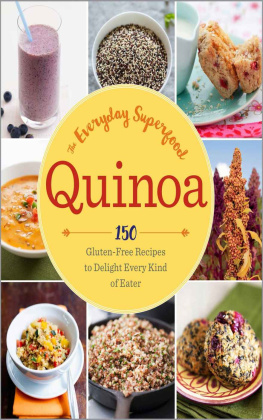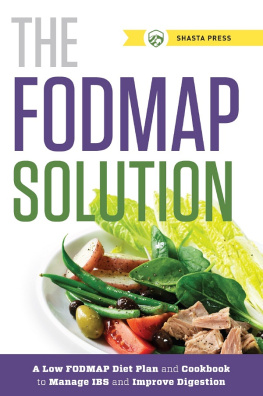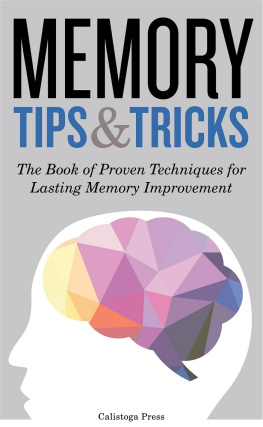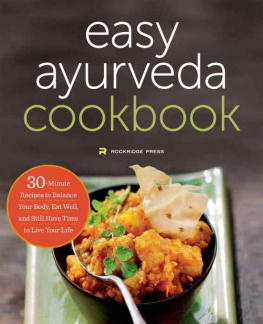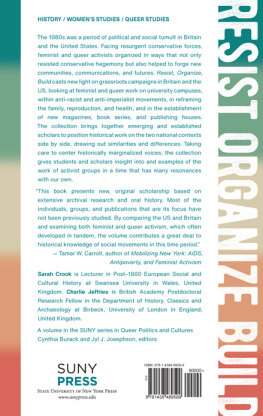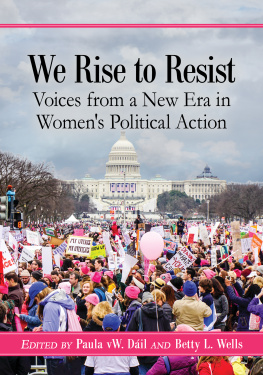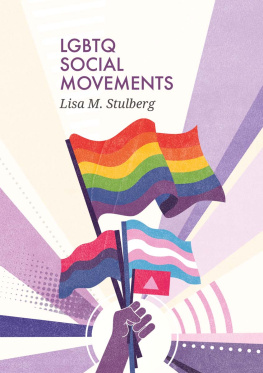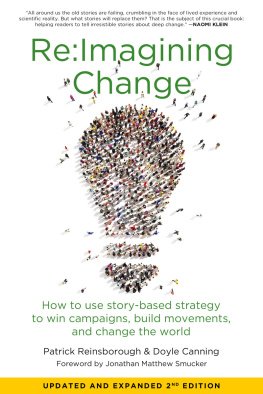Rise & Resist is the ideal handbook for the revolution. Clare Press has produced a thoroughly researched, engaging and exciting book, that will act as a template for the next phase of the current power-shift. From local to global, she interviews the players in the feminist and environmental movements, joining the dots on the biggest social change since the 1960s. This is an important and powerful work.
Tracey Spicer
Already known as a change-maker through her work in ethical fashion, Clare now tackles social justice and the climate movement in this elegantly crafted book. A necessary call to action on how we can reshape a more sustainable world.
Katherine Keating
The world needs everyday activists and this insightful book helps you navigate the issues from many angles.
Natalie Isaacs
These pages offer badassery, wit, courage and humour. A timely reminder to us all that if we dont like something, its up to each of us to get off our arses and do something about itthis is pure inspiration as to what that little something might look like for you.
Jess Miller
Climate science can be intimidating but Clare makes it easy to comprehend. Entertaining, educational and absorbing, Rise & Resist is a fantastic read.
Laura Wells
RISE
&
RESIST
RISE
&
RESIST
HOW TO
CHANGE
THE WORLD
CLARE
PRESS

MELBOURNE UNIVERSITY PRESS
An imprint of Melbourne University Publishing Limited
Level 1, 715 Swanston Street, Carlton, Victoria 3053, Australia
mup-contact@unimelb.edu.au
www.mup.com.au

First published 2018
Text Clare Press, 2018
Design and typography Melbourne University Publishing Limited, 2018
This book is copyright. Apart from any use permitted under the Copyright Act 1968 and subsequent amendments, no part may be reproduced, stored in a retrieval system or transmitted by any means or process whatsoever without the prior written permission of the publishers.
Every attempt has been made to locate the copyright holders for material quoted in this book. Any person or organisation that may have been overlooked or misattributed may contact the publisher.
Cover design by Sandy Cull, gogoGingko
Cover image courtesy Shutterstock
Typeset in 10/14pt Plantin Light by Cannon Typesetting
Printed in Australia by McPhersons Printing Group

9780522873733 (paperback)
9780522873740 (ebook)
Contents
Take up the battle. Take it up. Its yours. This is your life. This is your world.
Maya Angelou, on Oprahs Master Class, 2011
The future depends entirely on what each of us does every day. After all, a movement is only people moving.
Gloria Steinem, to TIME magazine, 1992
We can change the world, we will change the world. The question is, in what direction?
Richard Denniss, on the Wardrobe Crisis podcast, 2017
Authors note
rise vb. rising, rose, risen. 1. to get up from a prone position; to revolt: the people rose against their oppressors
resistvb. 1. to stand firm (against); not yield (to); fight
What do we want? Reverse the cuts! When do we want it? Now! In February 2018, the Country Womens Association of Western Australia staged the first political march in its 94-year history. Four hundred members of the organisation descended on Parliament House in Perth with placards, chanting to the tune of Waltzing Matilda, to protest cuts in rural education services. And I thought the CWA was all about baked goods.
This action came less than three weeks after tens of thousands gathered at Invasion Day protests across Australia, which in turn happened just five days after the second coming of the Womens Marchesthe first iteration, the day after Donald Trump was sworn in as US president in January 2017, had erupted across the world twelve months previously. In between, there was barely a contentious issue that didnt have us rallying somewhere. In the United States in August 2017 alone, there were 834 different demonstrations, marches, strikes, sit-ins and rallies. Its starting to feel like not protesting is the weird thing to do.
Researchers at Columbia University confirm that we are now living through a period of rising outrage and discontent, the likes of which we havent seen since the late 1960s.Trump, for example, polled about 2.8 million fewer votes in the 2016 US election than his rival Hillary Clinton, but he still won. Forty-two per cent of the eligible population didnt even cast their ballots.
There are numerous examples of a widening gulf between what governments and big businesses pursue, and what citizens want. In Australia, the majority opposes Adanis Carmichael mega-mine,
Meanwhile the gap between the super-rich and everyone else continues to grow. Tax avoidance at the top end of town is rifemore than a third of the 2000 largest companies operating in Australia paid zero corporate income tax here in 2015/16. Underfunded welfare services are showing the strain. There might be more jobs, but they are less secure and more often part-time. Most of those lucky enough to own their own homes have mortgages theyve no hope of paying off. We carry record levels of credit card debt. And for what? Our current consumerist model is a rortweve been trained to unthinkingly buy mountains of stuff we dont need, then throw it away, adding to a gargantuan waste problem thats choking the oceans with plastic. Then theres the creeping suspicion that theres more to life than a new phone or pair of box-fresh sneakers. No wonder we feel cornered and powerless when faced with all this.
Depression, anxiety and loneliness are on the rise. The Red Cross warns that nearly one in four Australians are lonely almost all the time or on a regular basis. Its such a worry in the United Kingdom that the British government has appointed the worlds first loneliness minister. Single-person households are increasing in affluent countries, while we are more transient and less likely to know our neighbours than in previous generations. As socialising moves into the virtual space, entire relationships are lived online, with barely a need to meet in person.
In this context, joining marches makes perfect sense. The opportunity to discuss, stand and chant together, shoulder to shoulder with other human beings; to be both emotional and physically presentin person, in real timearound a deeply felt cause, carries a visceral thrill. And to be recorded, to literally be counted for being there, moves us. This way we can begin to take our power back. Marches are on the rise because of the political climate and mounting fears that if we dont start doing right by Mother Nature it will be too late, but also because we yearn to reconnect.
Its not just marches, of course. Activism is growing everywhere, and its taking increasingly creative forms. Movements are building and linking together. The old silo mentality is falling away to be replaced by a new web of connectivity. The veteran American feminist Gloria Steinem has been talking for years about the need to connect social and climate-justice movements. The young Peruvian activist Maria Alejandra Rodriguez Acha believes its finally happening, as young women in particular are increasingly making spaces to to discuss our roles and experiences in climate advocacy, environmental activism and feminist movements.it worked for me. It was witnessing the excitement rising all over the world in the run-up to the Womens March on Washington that got me thinking about this book.
Next page

